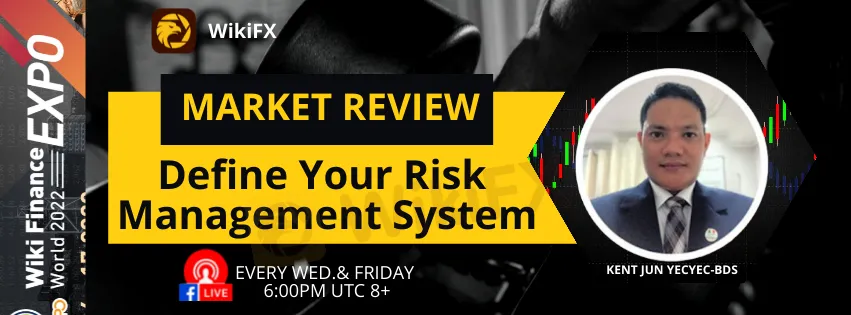简体中文
繁體中文
English
Pусский
日本語
ภาษาไทย
Tiếng Việt
Bahasa Indonesia
Español
हिन्दी
Filippiiniläinen
Français
Deutsch
Português
Türkçe
한국어
العربية
Define Your Risk Management System
Abstract:It's a great idea to define your risk management as soon as you start trading on a live account.
Defining your risk management system is one of the most crucial components of growing your account. Without effective risk management, there's a good possibility you'll lose more than you bargained for. Remember that risk is something over which you have complete control, so make sure you handle it well to limit your losses and enhance your earnings.

As soon as you begin trading on a live account, you should determine your risk management strategy. Most traders risk less than 2% of their account balance per deal. If you're just getting started, you might want to start with 1% or less and work your way up from there.
Join us tonight in our live session 6:00pm Philippine Time at WikiFX Facebook Page
Disclaimer:
The views in this article only represent the author's personal views, and do not constitute investment advice on this platform. This platform does not guarantee the accuracy, completeness and timeliness of the information in the article, and will not be liable for any loss caused by the use of or reliance on the information in the article.
Read more

Space World Capital - The Forex Broker You Should Not Partner with
Explore this guide to know the scam of Space World Capital, which does not hold a regulatory license to operate forex business.

Social Trading Goes Mobile at M4Markets
A new mobile application for social trading has been launched through a collaboration between brokerage firm M4Markets and fintech provider Brokeree Solutions

ACY Securities Expands Crypto CFD Offering with 24/7 Trading Access
ACY Securities, a global broker specialising in CFD trading across multiple asset classes, has expanded its cryptocurrency offering by introducing 10 new digital currency CFDs and enabling 24/7 trading access across all its supported platforms

Forex Trading in Malaysia: Is It Halal Under Islamic Finance?
Forex trading has become increasingly popular around the world as a way to invest and manage currency risks. In Malaysia, where a large part of the population follows Islam, many traders often ask whether forex trading is halal or haram under Islamic law.
WikiFX Broker
Latest News
WikiFX Gala Night Malaysia Concludes Successfully
IG Group Unlocks Over £425 Million amid a Capital Reduction
Capital.com Strengthens UK FinTech Ties with Key Memberships
Stock futures fall after S&P 500 notches new record to cap winning second quarter: Live updates
CNBC Daily Open: Keep calm and carry on, investors
10-year Treasury yield ticks higher as investors eye jobs report
Elon Musk's xAI raises $10 billion in debt and equity as it steps up challenge to OpenAI
Crypto Craze Fizzling Out? Here is Why
Public companies bought more bitcoin than ETFs did for the third quarter in a row
Stock futures are flat after investors sell tech names to start the second half of 2025: Live updates
Currency Calculator


